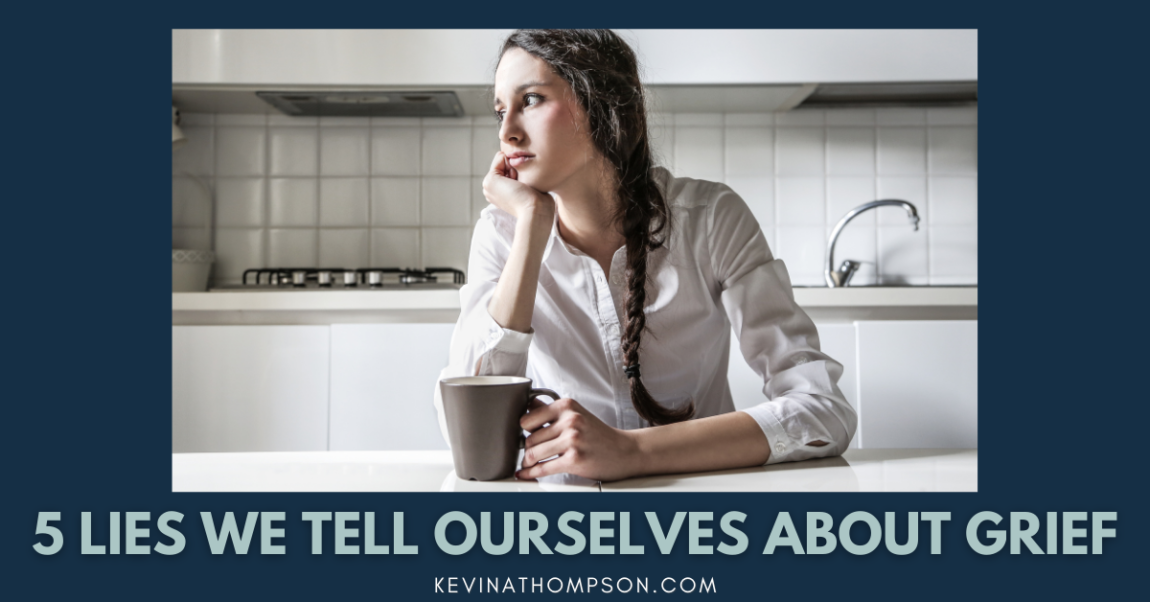Is grieving allowed in your family? Can you admit hurt? Can you name pain? Are tears allowed to fall without a kleenex being shoved into your face or trite words being said to downplay what you are feeling? Healthy families allow grief; unhealthy families do not.
In Fearless Families, I create the contrast between the Home of the Afraid and the Home of the Brave. The former is run by fear, while the latter is ruled by love. Both experience fear, but one is defined by it while the other is able to deal with it, put it in its proper place, and make wise choices. One of the great litmus tests diagnosing our own homes is how we handle grief.
The Home of the Afraid cannot grieve.
Lies We Tell Ourselves About Grief
The reason the Home of the Afraid cannot grieve is that it believes the lies that grief tells them. Rather than living in the truth, they are driven by false assumptions regarding grief. Some of those assumptions are:
1. If you ignore grief, it will go away. No, it won’t. A person who ignores their pain may not recognize its impact on them, but it is most definitely there. Trouble sleeping, unhealthy coping habits, difficulty with relationships, weight gain, weariness, and a host of other issues are all symptoms of grief. Ignoring grief does not diminish its power; it heightens it.
2. If you deny grief, it won’t hurt as bad. We believe that if we lean into pain, the hurt will grow. While it might feel easier to deny grief and the initial experience of suffering is difficult, the truth is that the more we deny grief, the greater the pain becomes. As we lean into our sorrows and sufferings, we experience pain, but it is less than what we would have to endure if we denied it. Many people run from grief simply because they think they cannot take the pain. What they fail to realize is that they are already enduring the pain; what they are actually running from is the healing. (See: The Most Overlooked Characteristic of Who You Want to Marry)
3. Your pain doesn’t count, because other people have it worse than you. Too often we believe there is a pain hierarchy and since another person’s grief seems worse than mine then mine shouldn’t count. This is a lie. Every grief deserves to be recognized, felt, and worked through. Just because you believe someone else’s pain is greater than yours does not mean that yours is not real. The worst pain I’ve ever felt is a kidney stone. It’s hard to imagine pain worse than that. Yet when my tooth hurts, I can’t pretend as though it doesn’t matter simply because the pain is not as bad as a kidney stone. Don’t get into the grief comparison game. Every sorrow matters.
4. Grieving is whining and no one likes a whiner. From an early age, we are accustomed to our concerns and worries being diminished. How many parents ignore the sorrows of their children and simply say “shake it off” or “get over it.” This trains us to deny our pain. We think that giving voice to our sorrows is winning. It’s not. It takes great courage to admit hurt. Grieving is not whining.
5. I should be over this by now. Humanity is horrible at predicting how long it should take to work through grief. While it often takes less time than we think if we are actually doing the work, it takes much longer than we realize when we are living in denial. I often talk about An Ever-Changing Grief. Grieving is a process and that process takes time. Never assume you should be over something by a certain time. Keep doing the work.
When You Can’t Grieve
Because homes ruled by fear believe these lies, grief is not allowed. Any sign of actually processing through pain, admitting the sorrow, and attempting to work through grief is avoided. Instead of grieving, these homes turn to other actions.
They project strength. Grief is often seen as a weakness, so homes who refuse to grieve project strength. They become more concerned with appearing ok than actually being ok.
They avoid being uncomfortable. Grief is foreign to us. Because we rarely have healthy grieving modeled for us, we avoid it at all costs. Unfortunately, healing often involves discomfort. Consider a doctor’s appointment. To diagnosis and heal a condition we often have to be willing to feel discomfort–most tests and treatments involve discomfort.
They seek relief in material things. Ignoring grief does not mean we are pain-free. The sorrow is present, we just don’t admit it. In order to find relief from the pain, we often turn to material things. The average widow spends the life insurance check within six months. It’s not that they have bills to pay. More often it’s that they have pain they are trying to soothe and their method is to buy things.
They fight for power. Because grief makes us feel vulnerable, having control becomes uber important. The thought is that if they control a situation, they can keep their pain hidden.
All four of these actions are a good description of how to kill a family. Sadly, unprocessed grief can do just that.
The Courage to Grieve
As tempting as it is to bypass grief, we cannot afford to ignore our pain or the pain of others. Instead, strong families are willing to lean into grief, sorrow, discomfort, disappointment, and pain. They are willing to grieve. They may not do so perfectly, but they understand the necessity of the process.
If you feel as though your family does not grieve well, or at all, check out Fearless Families. It will give you concrete steps to choose a better way.




One Response to 5 Lies We Tell Ourselves About Grief